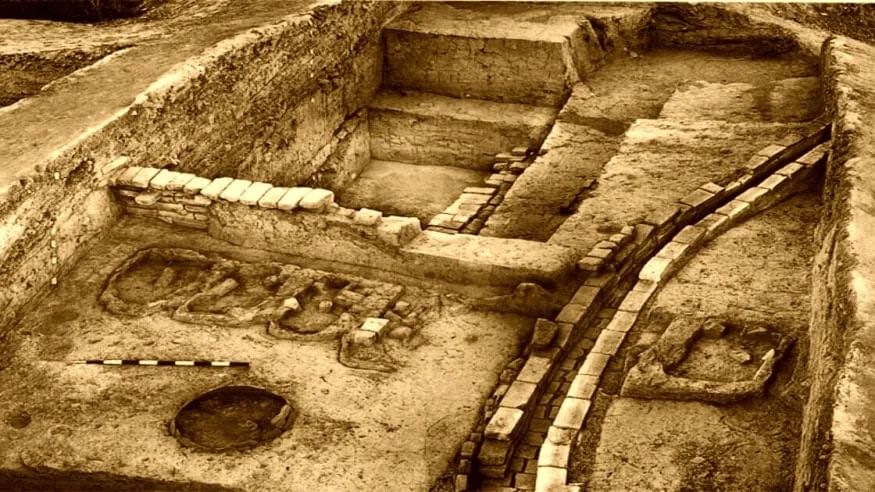Class 6 History Chapter 3 Question Answers - In the Earliest Cities
Very Short Q&A:
Q1: Name the place where the large piece of white stone having the inscription of Harappan script was found.
Ans : Dholavira
Q2: What was the purpose of Fire altars in Harappa?
Ans : To perform sacrifices
 A fire altar in Harappa
A fire altar in Harappa
Q3: Most of the beads that were found in Harappa were made of ____________.
Ans :Carnelian
Q4: The City of Lothal stands beside the Gulf of Khambat. True/False
Ans :true
Q5: What was the intensity of rainfall in Harappa?
Ans :heavy rainfall
Q6: Where was the city of Lothal situated?
Ans :Lothal was situated near the areas where raw materials such as semi-precious stones were easily available
Q7: The huge tank of water in located Lothal was used as _____________.
Ans : Dockyard
Q8: What was the purpose of seals?
Ans :Seals may have been used to stamp bags or packets containing goods that were sent from one place to another.
Q9: Name the most important centre for making objects out of stone, shell and metal.
Ans : Lothal
Q10: Generally the Harappan writings have been found on Black stones. True/False
Ans : false
Q11: Where is Dholavira located?
Ans : Rann of Kutch
Q12: Write the name of a new tool which was used to dig earth for turning the soil and planting trees.
Ans : Plough
Q13: What is faience?
Ans : Faience is a material that is artificially produced, it was used to make beads, tiny vessels etc.
Q14: Name the Harappan cities where sacrifices may have been performed.
Ans : Kalibangan and Lothal
Q15: From present-day Gujarat, Iran and Afghanistan, the Harappans obtained __________.
Ans : precious stones.
Q16: What was the name of the special tank of Mohenjodaro?
Ans : the Great Bath
Q17: Harappa was discovered__________ years back.
Ans : 80
Q18: The city of Lothal stood close to the Gulf of _________.
Ans : Khambat.
Q19: What do we call to the western part of the Harappan city?
Ans : Citadel
Q20: Name the places where traces of fire altars have been found.
Ans : Kalibangan and Lothal
Q21: Name the city of Harappa that was divided into three parts.
Ans : Dholavira
Q22: Invasion of aryans have been the reason for the decline of some of the Harappan cities. True/False
Ans : True
Q23: We find proof of abandonment of cities like ____________ and _______.
Ans : Sind and West Punjab
Q24: Name the city where Cotton was most probably grown.
Ans : Mehrgarh
Q25: What was the shape of the Harappan seal?
Ans : Rectangular
Q26: Name the metal that stands out due to its absence at the Harappan cities
Ans : Iron
Q27: Who were Scribes?
Ans : They were probably the people who wrote on seals and other materials about transactions and other factors
Q28: The special buildings of the city were constructed at the _________.
Ans : Citadel
Q29: Name the material used to made a plough.
Ans : Wood
Q30: Mention a unique finding of Dholavira.
Ans : Large letters of Harappan script
Q31: State a features of the houses constructed in Harappan civilisation.
Ans : drainage system
Q32: What was the purpose of 'great bath' in the Harappan civilisation?
Ans : bathing on special occasions
Q33: What were the important functions of the ruling class people?
Ans : Construction of special buildings and sending envoys
Q34: How the Great Bath was made water tight?
Ans : By Natural tar
Q35: What do we call the pattern in which bricks were laid to make the walls stronger?
Ans : Interlocking
Q36: Name two popular gold mines in Karnataka.
Ans : two popular gold mines at Hatti and Kolar in Karnataka.
Q37: What was the common feature of Harappan buildings?
Ans : baked bricks
Q38: People in Egypt carefully preserved the dead bodies known as _____________.
Ans : bitumen
Q39: The city of Lothal was located on the banks of the river __________.
Ans : Bhogava
Q40: What do we call to the pyramids build by people of Egypt?
Ans : huge tombs
Q41: The Egyptian people used to preserve the bodies of their kings after their death and buried them in these pyramids. True/False
Ans : true
Q42: Name the states where the two sites of the Harappan civilization were vacated due to flood.
Ans : Sind and West Punjab
Q43: The Pharaohs built huge tombs in Egypt, which are known as __________.
Ans : Pyramids
Q44: What was the shape of pyramids?
Ans : Pyramids were shaped as inverted cone masonry structures.
Q45: What is Mummy?
Ans : A Mummy is a corpse, whose skin and organs have been preserved
Q46: What do the archaeoligists described the smaller but higher structure found at Harappan sites?
Ans : Citadel
Q47: What is the second name of Interlocking pattern?
Ans : Interlocking pattern is also known as running lane pattern
Q48: The scribes were skilled in the manufacturing of seals. True/False
Ans : True
Q49: Mention the name of a metal, which was mixed with copper to produce bronze during Harappan period.
Ans : Tin
Q50: What were the uses of bronze metal?
Ans : This metal was used to make weapons and also agricultural implements.
FAQs on Class 6 History Chapter 3 Question Answers - In the Earliest Cities
| 1. What are the earliest cities? |  |
| 2. How were the earliest cities different from villages? |  |
| 3. What were the major occupations in the earliest cities? |  |
| 4. How did the earliest cities contribute to societal development? |  |
| 5. What led to the decline of the earliest cities? |  |

















